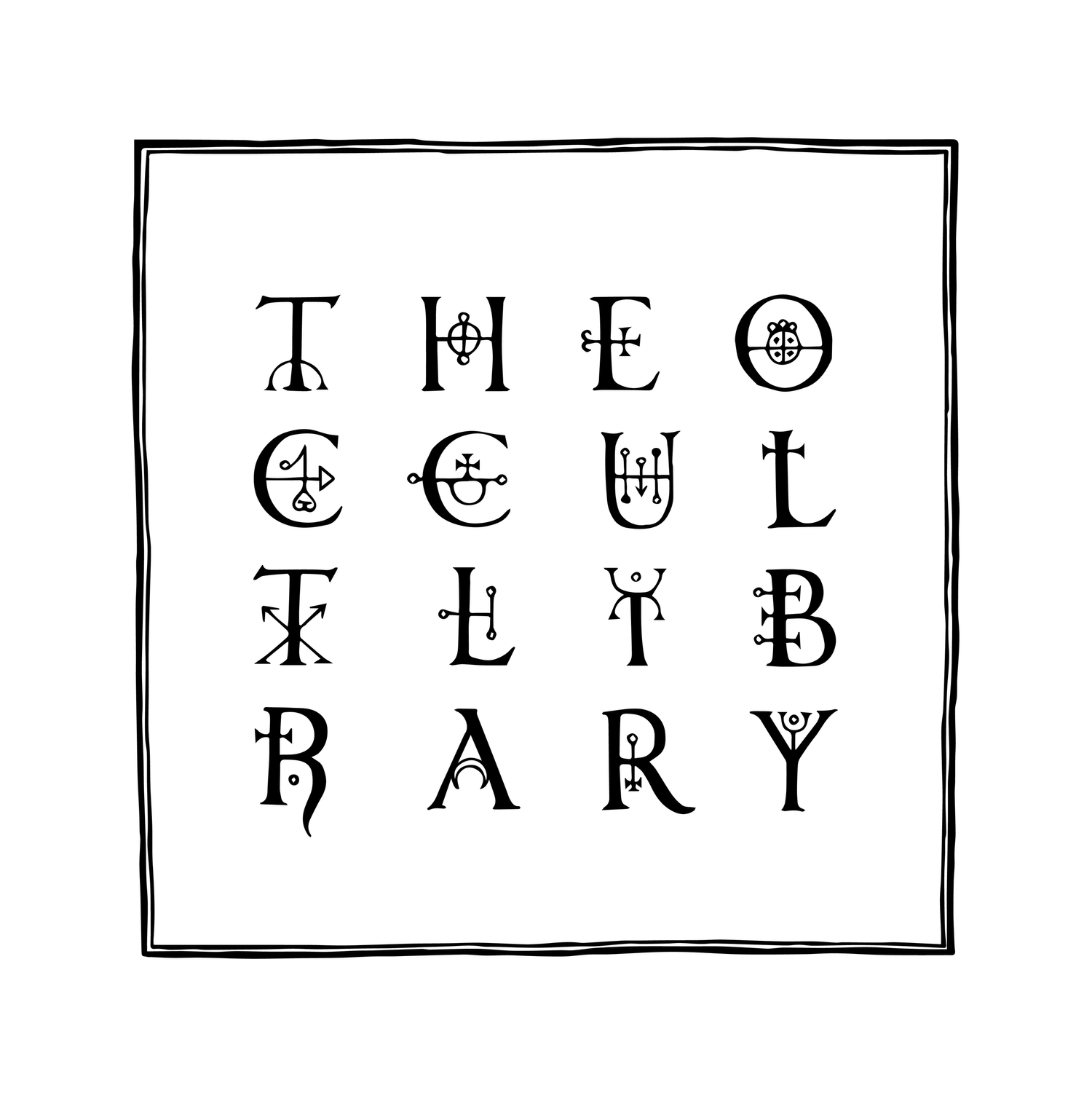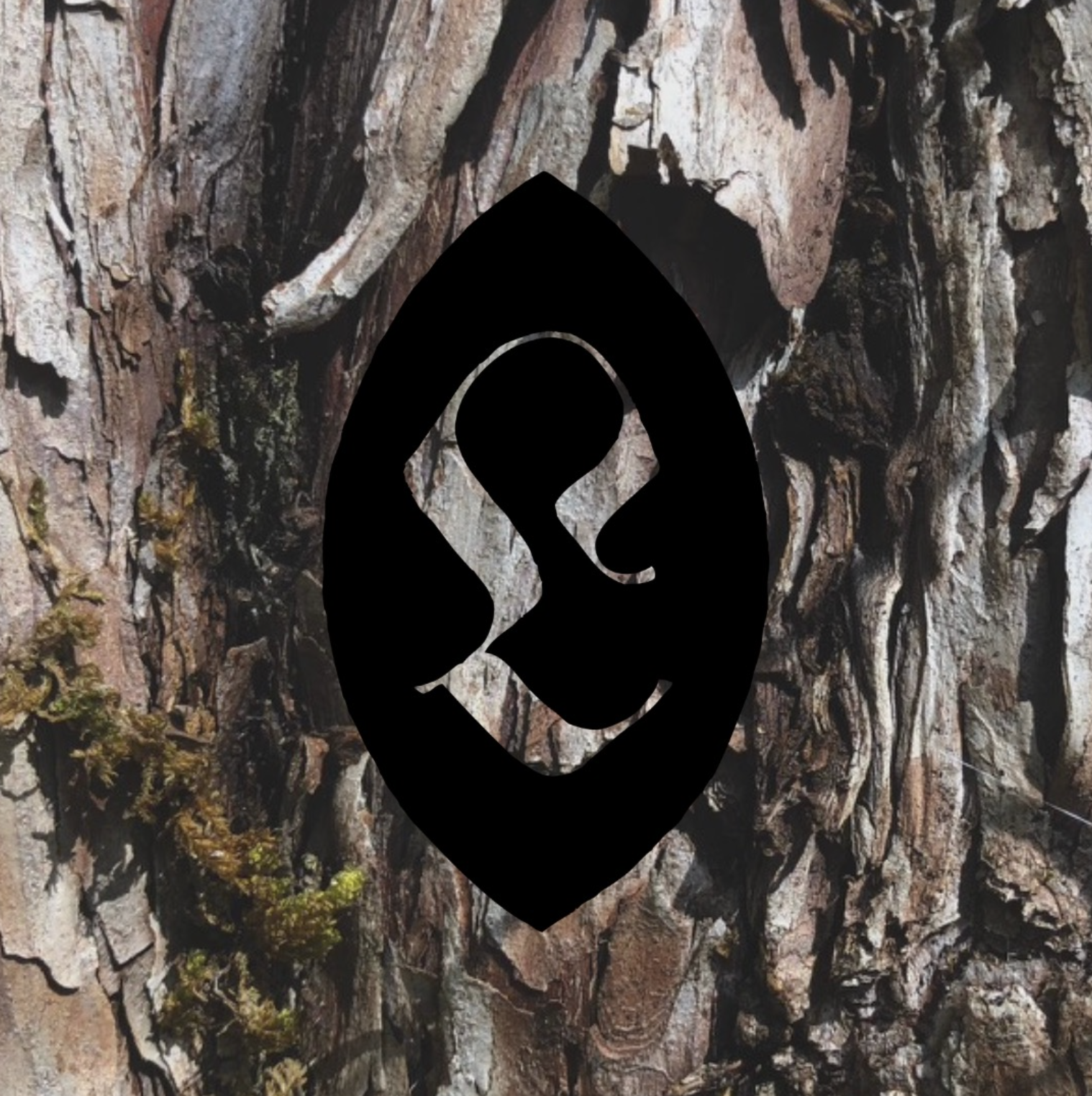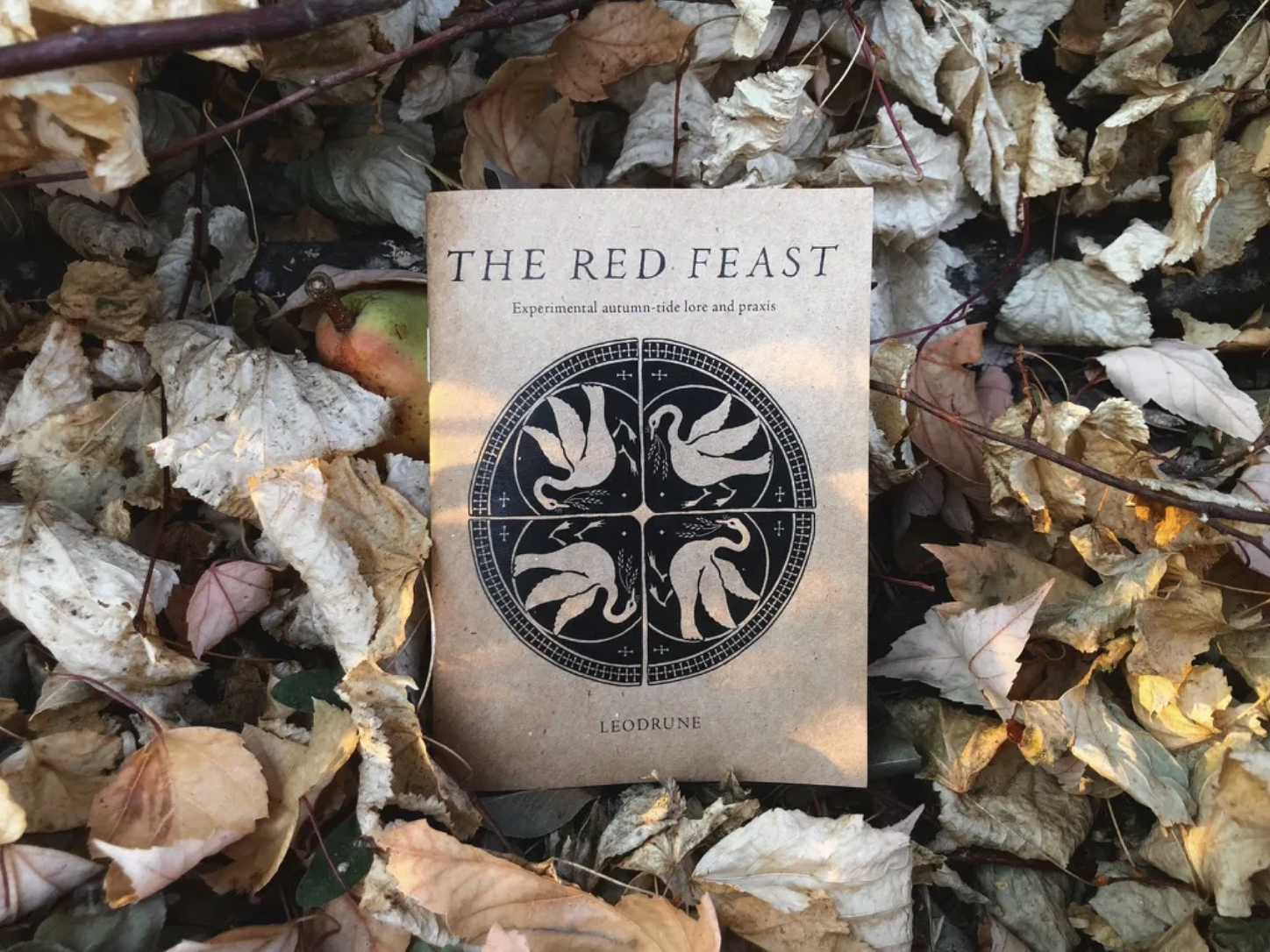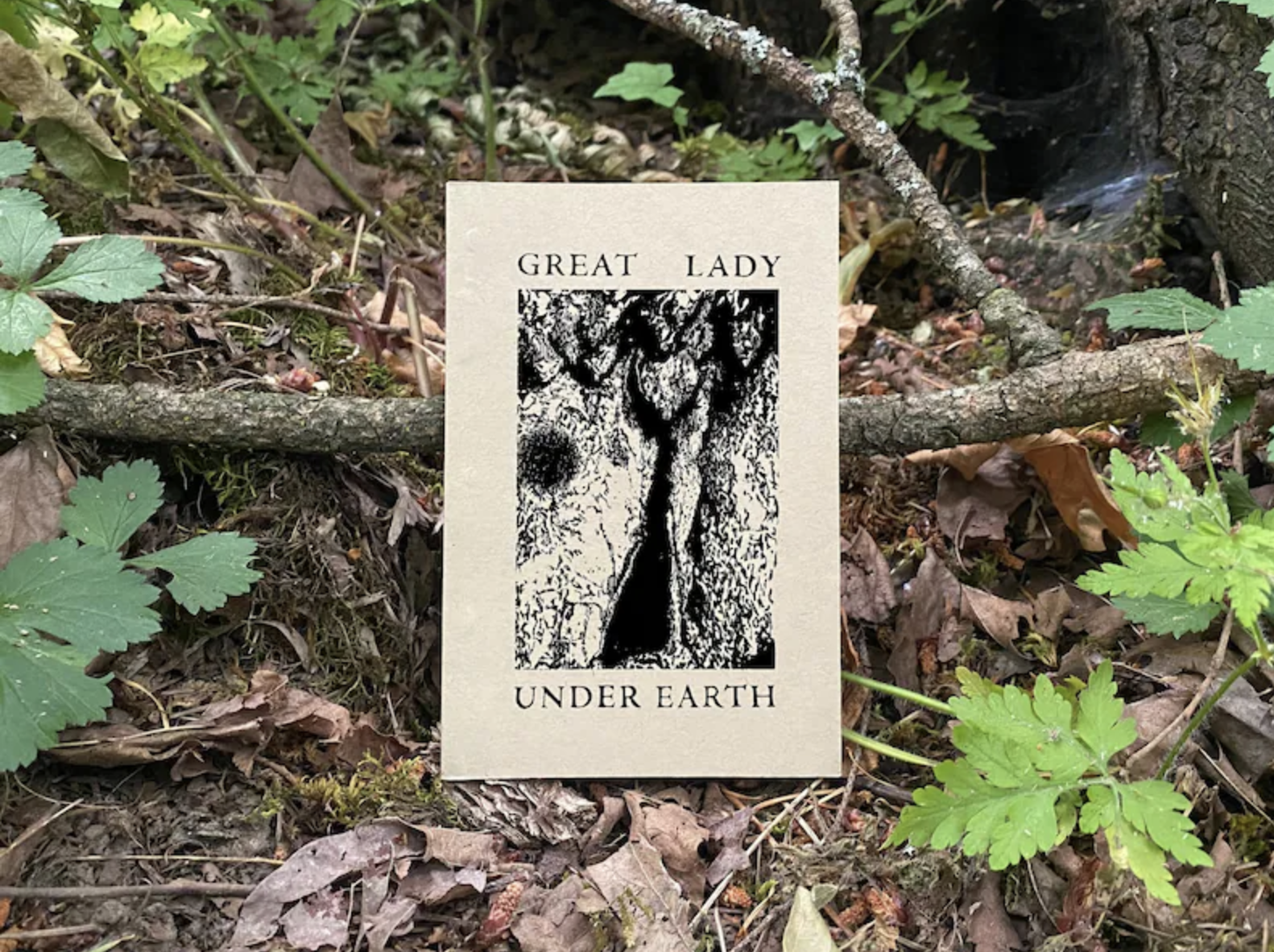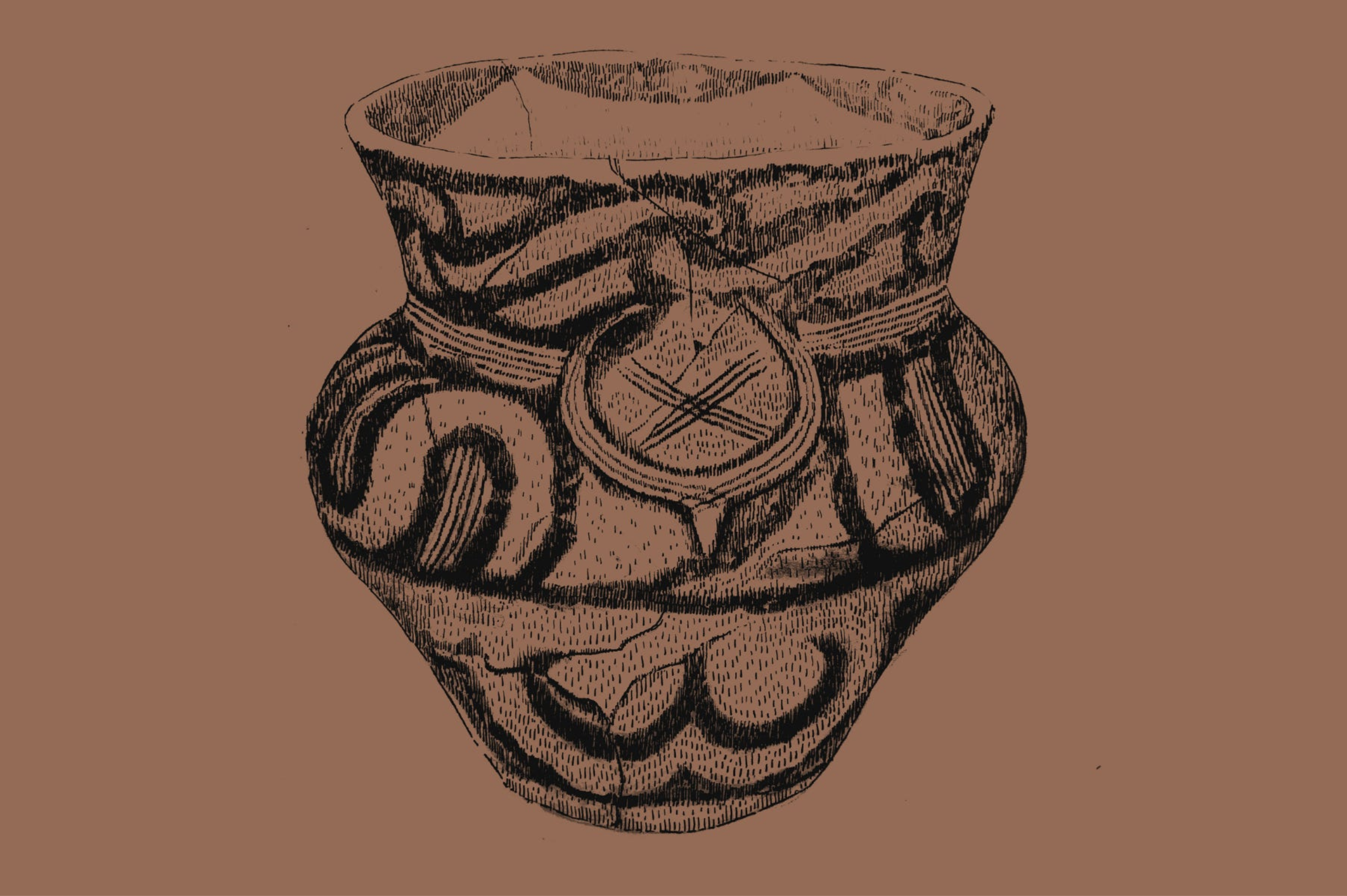A Conversation with Leodrune Press
Leodrune Press logo
This past week, The Occult Library had the opportunity to engage in conversation with Sylvia & Tristan Eden of Leodrune Press. Leodrune Press is a small press run by Sylvia & Tristan Eden, based in the Pacific Northwest of the United States. They are familiar to many folks in the occult community for written works which explore & express ritual life, folkways, craft, and seasonal practice. These explorations are rooted in an ecological consciousness borne from the landscape in which Sylvia & Tristan live & practice.
Sylvia & Tristan have also generously assisted The Occult Library from the outset by offering illustrative work to our icons, lettering, and design. We are delighted to offer up the following conversation:
OL: Hello Sylvia & Tristan. Thank you for taking the time to sit down and carry out this interview, and much gratitude for your offering of the design elements on The Occult Library website. Leodrune Press began in 2018, and you express that it is “...an outgrowth, a fruiting body, born from our shared ritual practice here in the Pacific Northwest’s ancient, wounded, and vibrant biomes.” What are some key moments or experiences that led to the inception of Leodrune during that period?
LP: Hi there! Thanks so much for the opportunity– it has been a joy to provide our skills to the Occult Library. So many events led to the eventual creation of Leodrune. It’s inextricable from the beginning of our relationship. In brief, we met each other on the internet in 2018; as we were individually working on musical projects at the time, we began as creative collaborators to help execute those projects. We worked well together, and that professional connection developed into a friendship. I [Sylvia] had already been running a witchcraft blog where I would post rituals I had written, which I had started compiling into zines. Tristan and I fell in love and moved in together quite quickly. He began helping me assemble zines and selling them online and at local events, but it was slow-going because we both worked full time.
When the pandemic began, selling zines became our only income source, so our commitment to that prospect became much greater. Our magical comprehension was limited during Leodrune’s first couple years, as we were mainly utilizing writing and publishing as a way to learn these things ourselves while making something of a living. Those materials are all discontinued now, not because they are bad per sé, but because we had not yet found our own voice, nor taken the time to really integrate what we were learning in a way that could lead to truly original & insightful material.
Though we had already built a steady rhythm of nature visitations leading up to the pandemic, it allowed us even more time to go out as a primary pursuit, which really opened our eyes to Earth’s spiritual ecology and seasonal cycles as they manifest here in the Pacific Northwest, as well as the realities of the irreversible changes this biome is enduring. We had begun exploring a shared ritual practice to meet the spiritual yearnings prompted in us by our time with nature.
Besides the myriad ritual experiences that will remain undisclosed, the key project through which Leodrune has found its power is Great Lady Under Earth. This is the first book we wrote ritually, as in the entire creation of the book was performed inside ritual time and space. This is largely how we will proceed with our publishing.
OL: Leodrune has clearly grown, undulated, and evolved over the past few years. Could you describe some of the challenges and experiences you’ve encountered with your identity both as publishers and as ritualists? How have these two realms informed each other and married their various aspects together?
LP: You’re right to say Leodrune undulates, like a snake or an eel does– the voice which is emerging through it belongs to a living spirit we are still getting to know ourselves.
In terms of challenges, there were the growing pains of harmonizing our written works with the understandings we were coming to through our rapidly-developing ritual practice. Our first six or seven zines were mostly re-presenting agreed-upon beliefs & correspondences we were learning through book research. Leodrune’s readership grew significantly at this stage of our career, giving us a bit of a platform before we were fully confident in our contributions to the occult publishing world. We rapidly outgrew the material we had written, because we were voraciously practicing and researching together. What we began learning through ritual became challenging to publish given the nature of our early publications, and we knew our books would have to change significantly. Leodrune needed to molt, continuing the snake metaphor, so we set our sights on archiving the early books and remaking our books about seasonal ritual praxis from scratch (currently halfway through that process with Red Feast and Black Feast).
The Red Feast. A Leodrune publication exploring “Experimental autumn-tide lore and praxis.”
Another challenge was in our choice to retire the word ‘witchcraft’ from our publications. While our personal practice will always bear certain marks of witchcraft, the body of practices and concepts that fall under the blanket of that term no longer accurately depict or describe our approach. What we are doing shares sympathy with what people throughout history have been doing, whether it was called witchcraft or not: engaging in ritual correspondence with the natural world for survival, for relationship, for meaning-making and living well. No longer offering that framework through which to interpret our writings, we were unsure how readers would react. Thus far, it has been with enthusiasm.
As far as other challenges, we are often carefully walking the liminal space between academia and folkways. We acknowledge the value of academic knowledge to occult understandings, to the preservation of traditions and the analysis of ritual action, but also encountered its limitations insofar as what can be claimed and ‘proven’ via the historical record. We have shifted to presenting ideas and inferences in our work from a grounded place of ritual experience that doesn’t rely on academic knowledge, but can be emphasized and articulated in tandem with it.
As far as the marriage of ritual and publishing, we have termed our current approach simply: Book as ritual artifact. While our early materials were crystallizations of our own journey through learning the fundamentals of magic and ritual, our current works are manifestations of the rituals we perform to uncover information, imbued with findings from subsequent research into various avenues of interest that such rituals offer us.
OL: Your work as ritualists, writers, and crafters has been greatly informed by the pressures that the Anthropocene has introduced to ecological life, as well as the inner shifts that it precipitates. Your work reflects both a deep engagement with the Earth, but also a sense for the magnitude of the situation. To what extent do you feel your own urgency & pressure in regards to offering this work up to the community? How does a sense for pace emerge?
LP: One of Leodrune’s central intentions is to offer modes of spiritual understanding & living that better prepare us for the changing climate and the long, oncoming collapse of industrial civilization. In fact, we don’t feel any particular sense of urgency to offer these writings to others, because we’re not certain the fruits of our work will fully ripen in our lifetime. We aren’t seeking to prevent the biospheric changes to come, but to prepare for them. There is nothing to be saved; things will just change. And what’s critical is that we are present for those changes, are outside witnessing and participating in those changes.
If humans are going to continue living on this planet, it will be through carefully cultivating an alternative approach to All Life, one that does not strictly rely on, nor necessarily betray, pre-existing traditional understandings, and one that re-integrates the magical into the practical. It will be through re-encountering the animal instincts and sensitivities that never left us, and embracing our embeddedness in the Grand Ecology. We consider what we’re doing to be a kind of groundwork to re-introduce these ideas with a fresh voice, with new language. We are pretty young relative to other figures in the occult publishing sphere, and do believe that our youthful outlook at the precipice of vast climatic upheaval allows us to share a perspective that elder figures in the occulture can not offer. From here, being in our mid-twenties, we are looking at a lifetime of radical change that older people are not required to prepare for. We see, at this moment in time, cause to stay adaptable, dynamic and intuitive in our lifestyle and praxis, and cause to encourage others to do the same.
We do not plan to stop writing or publishing, so the pace of our work will be steady. Like many, we are tethered to the strides of capitalism, which has thus far required us to release works in quick succession.
A copy of the Leodrune publication Great Lady Under Earth.
OL: Bookmaking itself is an art & craft which is inextricably tied to direct work with the materials of the planet: fiber, paper, ink, and so forth. While the value of this practice is evident in the context of the bound work, what do you feel that bookmaking offers in regards to the reader? Do you feel that the primacy of bound & printed material claims – or reclaims – something in regards to tactility, touch, and ecological connection?
LP: We’ll give you a crooked answer here. Though we recently made the shift to perfect-bound paperbacks that are made elsewhere, we spent years making many thousands of zines by hand– assembling, folding, stapling and stitching, cutting, pressing– and developed great respect for the physical act of book creation, and were witness to the real magic potencies of the craft. Books are among the greatest human technologies. They will be a fundamental mode of communication for as long as written language is around– and will certainly outlive digital record-keeping.
Because we now have the ephemeral, nebulous version of written word available to us via the internet, books have come to feel very romantic for their tactility and antiquity. We mustn’t forget that written language is still an abstraction of actual embodied communication; we acknowledge a primacy to oral language above written word. Books allow us to offload what used to be the responsibility of human memory. They represent a desire to ‘fix’ knowledge in place, in stasis, hoping to exempt that knowledge from the changes inherent to time and life. The words on a page aren’t alive unless they are uttered into physical space by a living voice. Writing can only ever represent the world: which, at its best, will lead you outside to find out about the world for yourself.
Books as objects symbolize the acquisition of hidden knowledge. In order to engage books properly, though, they must be used, read aloud, cracked, worn out. The powers of the book fade into unconsciousness when they are appreciated only for their visual beauty and technical construction.
Though hardcover books are often favored for their aesthetics and longevity, especially in the occult world, they are at greater risk of being shelved and admired from afar. Paperbacks, on the other hand, are perishable, are meant to be brought outside, rained on, tattered. We’d rather make books that are read once and burned to ash than create a collectible hardback.
OL: You recently began a Substack page online through which you expand on printed materials, and offer up adjacent essays. However, certain essays – such as The Burned House Horion – in turn have been iterated into print. What do you find most valuable about opening this online space for publishing efforts?
Original Leodrune art for The Burned-House Horizon.
LP: Our original staple-bound zines highly limited the amount of content we could include; we were always forced to cut a lot of material. We initially created the Substack as a storehouse for peripheral and additional writings on our books that weren’t able to find their way into the final drafts.
In terms of publishing efforts, having a blog takes a bit of pressure off of writing for us. It allows us to write without the goal of publishing, then allows us the chance to look back and identify the gems to print as special releases, which we still hand-assemble in the original way. We can write more experimentally, more free-form and meandering, without needing to edit and illustrate.
Eventually we’d like to move off of social media, and Substack is where we will be for the foreseeable future. Blog posts are such a tried-and-true form of expression on the internet, and there’s something very full-circle about starting out with a blog and ending up there again.
OL: You are formidable visual artists in your own right, and we are grateful to have your illustrative lettering adorn The Occult Library website. How does your illustrative practice serve to inform your work? Is ritual life as integral a part of your illustration as writing?
LP: The illustrations we feature in our books are actually the least spiritual or ‘occult’ aspect of our work. We think of them more as design work using technical skills, whereas the writings receive most of our creative energy. We are engaged in private ritual art-making, but have no plans to publicize it. We do enjoy offering our illustrative skills to our community, and often take on freelance commission work.
OL: As a closing note – you emphasize the importance of traditional forms of “folk science” as an antidote to the knowledge production of what you refer to as the “overculture.” What encouragement would you offer those who wish to begin engaging their own forms of folk knowledge, craft, ritual, or ecological practice?
LP: As the internet bloats with chaotic and conflicting information, we must return to accumulating knowledge for ourselves. In our years of intense research and practice, after rapidfire trial & error, we have encountered no better advice than to try– to go outside and try. Traditions are born from intuitive attempts at contact. At a time when fewer and fewer people are involved in ritual traditions, we urge you to engage the technology of the ensouled body to learn. Look away from the heaps of pre-recorded discoveries and return to the mysteries of phenomenology.
OL: Sylvia & Tristan, thank you once again for taking this time to give us a glimpse into the work of Leodrune Press. We look forward to your coming works, and wish you the best for your practice & publishing.
Leodrune Press print materials can be found via:
https://www.etsy.com/shop/leodruneshop
Or, find theiry writing via digital means at:
https://leodrune.substack.com/
We thank our readers for engaging this interview, and for their continued support. We look forward to sharing further interviews, features, and overviews detailing aspects of our occult community. Until we find you next week.
— The Occult Library staff
